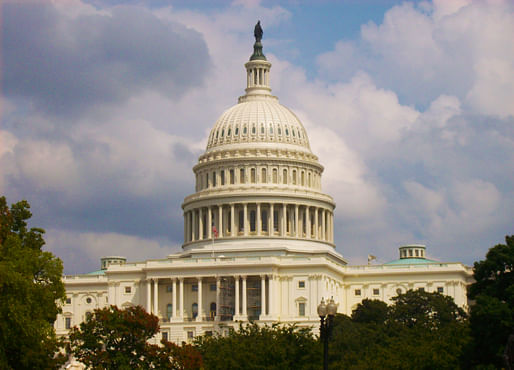

The United States Senate and House of Representatives have both passed the CARES Act, $2 trillion economic aid package crafted in response to the coronavirus (COVID-19) crisis, the largest government stimulus in the history of the United States. The historic effort, which was signed into law by President Donald Trump Friday afternoon, bears wide implications for American architecture firms and their workers.
For one, the plan will deliver a one-time $1,200 direct payment from the federal government to most individuals in the country making less than $75,000, with a slew of protections and expanded benefits for people who have lost their jobs or have had their businesses impacted by the economic slowdown put in place to slow the spread of the virus. For individuals, the package also offers relief from certain student debt obligations, as well as allotments for students to receive certain types of aid and income through the duration of the crisis.
The plan also expands who can apply for unemployment insurance to include a greater number of freelance and gig economy workers. The measure, however, only offers benefits to people with valid Social Security Numbers, CNN reports, with certain exceptions made for members of the military.
(The American Institute of Architects has put together an explainer for the aid package that highlights the significant components as they apply to architecture firms and workers)
On the employer side, the aid package offers financial resources for small and medium-sized businesses with the goal of keeping current employees on payroll through the duration of the crisis, helping businesses meet overhead, and granting relief from certain business taxes, all as long as companies meet a set of conditions.
Specifically, The New York Times reports that the bill authorizes $377 billion in loans of up to $10 million for businesses that employ fewer than 500 people, a threshold that a large percentage of architecture firms fall below. In several ways, the package is written to help businesses like architecture firms navigate through this crisis financially. The most recent AIA Firm Survey Report indicates that over 90% of architecture firms employ fewer than 50 people and that this group makes up nearly 50% of industry staff, for example. These firms are poised to access the help and have likely seen a great deal of financial uncertainty in recent weeks, as the economic shutdown has closed construction sites and imperiled projects across the country.
Economists have indicated that the United States economy is already in a recession and that this state could persist for months, depending on how long it takes to reign in the spread of the disease. A recent AIA Architecture Billings Index report indicated that as of February, architecture firms were still doing well, but a new report published Friday indicates that "50 percent of architecture firms reported fewer new design projects for March."
To help these sorts of businesses survive the shutdown, funding will be provided so that companies can continue to pay employee salaries, maintain paid sick or medical leave, cover company insurance premiums, and fund other expenses like mortgages, rents, and utility payments. According to the plan, the amount of each loan spent within the 8 week period following its receipt by the company will not have to be repaid if the funds are used for the above expenses.The expectation among economists and business leaders is that once the spread of the virus is stopped, economic conditions will gradually ramp up to a higher level of activity. The aid package aims to help small businesses survive this period of drastic uncertainty without having to resort to massive layoffs.
Additionally, the plan broadens the pool of entities that can apply for the government’s Economic Injury Disaster Loans (EIDL) to include Tribal businesses, employee cooperatives, Employee Stock Ownership Plans (ESOP) with fewer than 500 employees, and any individual operating as a sole proprietor or an independent contractor. It also brings $240 million in funding for Small Business Development Centers and Women’s Development Centers as well as $10 million for Minority Business Development Centers across the country. An additional $10 billion for grants to businesses that do not qualify for EIDL loans is also included in the aid package.
To help bigger businesses, the federal government will extend low-interest loans, requiring that these larger companies retain at least 90 percent of their workforce at full compensation and benefits through September 30, 2020.
The American Institute of Architecture (AIA) issued a statement Thursday supporting the effort.
2020 President Jane Frederick, FAIA writes, “This is the most significant relief for businesses the Senate has approved since the COVID-19 crisis began.”
Frederick adds, “We’re pleased that all of these vital businesses are rightfully recognized as a priority. Architects will be a critical part of economic recovery, and AIA has forcefully advocated for infrastructure investment to stimulate recovery, as well as relief for businesses and employees. This relief package is a good start, and AIA continues to work with policymakers to ensure our members’ priorities are included in additional legislation as we continue to address this crisis.”
In a separate press release published Friday, AIA states that over 4,500 AIA members wrote to their representatives urging passage of the CARES Act.
The passage of the bill comes as the AIA creates a working task group focused on bringing architectural expertise to the growing number of building-to-hospital retrofits taking shape across the country in response to the virus.
Editor’s Note: While every effort has been made to quote accurate figures and information, using respected sources for this breaking news, Archinect welcomes any corrections or clarifications that may arise.
No Comments
Block this user
Are you sure you want to block this user and hide all related comments throughout the site?
Archinect
This is your first comment on Archinect. Your comment will be visible once approved.